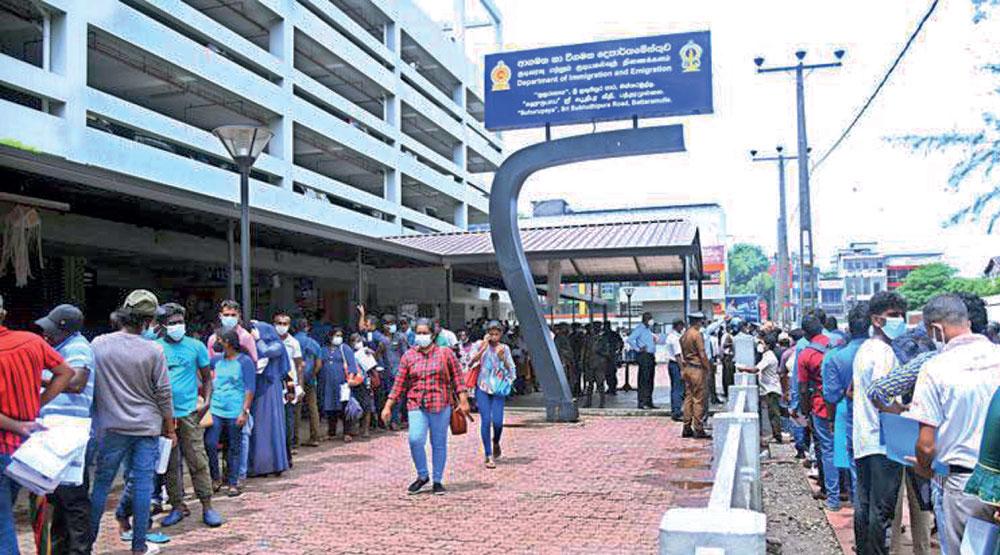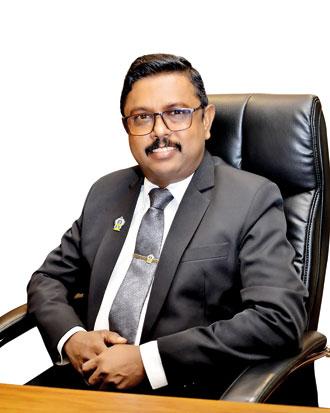Reply To:
Name - Reply Comment

The Department of Immigration and Emigration has taken steps to introduce the new e-passport to the public
This article is based on an interview done with Immigration and Emigration Department Controller General Harsha Ilukpitiya on the new e-passport system and new visa services that would be introduced to place Sri Lanka on the world map.
The Department of Immigration and Emigration has taken steps to introduce a new e-passport to the public. In 2015, the International Civil Aviation Authority (ICAO) announced that all countries should adopt an e-passport system. As such, around 160 countries including Bangladesh and Maldives in South Asia have commended issuing e-passports. But even after nine years, Sri Lanka hasn’t yet implemented the issuance of e-passports.
 Even though plans were afoot to implement this service, all these efforts proved futile. However, since 2023, fresh plans were underway to design the e-passport. As of today, the procurement process has been completed and a request has been made to obtain five million e-passports. While an international body is overseeing this process, Sri Lanka will start using e-passports from November on wards, according to Ilukpitiya.
Even though plans were afoot to implement this service, all these efforts proved futile. However, since 2023, fresh plans were underway to design the e-passport. As of today, the procurement process has been completed and a request has been made to obtain five million e-passports. While an international body is overseeing this process, Sri Lanka will start using e-passports from November on wards, according to Ilukpitiya.
The existing passport had been designed in 2002. This passport has been procured right through and there had been no change whatsoever. However the cabinet had been informed about the need to make changes in the passport. As a result, the procurement process for the e-passport got underway.
|
Since the design in the present Sri Lanka passport can be forged it has become a weak document as of today
|
Sri Lanka’s passport design can be forged
This is why a company that produces e-passports to many other countries was selected for this task. This Company had already begun the designing process. The quality and standard of a passport depends on how many other countries are issuing free visa for a particular country. For example, 195 countries issue free visas for a passport issued from Singapore. Therefore a passport from Singapore is valid in any country. But many countries decline issuing free visas for a passport issued from Sri Lanka because the existing design can easily be forged. One of the reasons is that the Sri Lankan passport has become a weak document as of today.
According to the international HENI index, Sri Lanka was at the 105th place. This index analyses how a passport is being made, the documents required, the credibility of these documents, the criteria that are being followed, the manner in which photos are obtained and even the way in which passports are being stored. “The International Civil Aviation Authority conducts an audit once every four years to find out how passports are being issued. The audit for Sri Lanka was done last year and the Authority was satisfied with the manner in which we issued passports. As a result they upgraded our position from 105 to 96. But this is not our ultimate goal. Our goal is to develop a passport that could be submitted to almost any country to obtain a free visa. Therefore our goal is to reach the 50th position in this index as soon as possible,” said Ilukpitiya.
The credibility of a passport could be determined at the time when an individual is leaving the country or when returning. This is by checking the details of his or her passport with information registered in the system, according to Ilukpitiya. “But once someone leaves the country with a passport, there’s a chance of changing details of identity. Someone could possibly swap his identity with that of another. We cannot check the accuracy of identity with the existing system. For example, it is possible for an Australian citizen to come to Sri Lanka and change the bio page of his passport including the photo and produce a fake passport. So this individual could use his actual passport to leave the country to say Thailand and from there he could use his fake passport to enter Australia. Once they reach their destination it is difficult to prove his true identity,” he explained.
According to Ilukpitiya, many people have left the country through such illegal means. “Therefore our passport is not being recognised as an authentic document. Therefore the best way to put an end to such frauds is through an e-passport system. One special feature in an e-passport is that there’s a chip to store information. This chip carries information regarding the owner of the passport.
“An e-passport would provide accurate details at an airport. It would help verify details of a passport holder. Once it has been proven that the actual passport holder has arrived there’s a high chance of our passport being recognised and for other countries to issue a free visa,” he added.
 |
| Immigration and Emigration Department Controller General Harsha Ilukpitiya
|
 On the other hand there is another group of people who visit Sri Lanka for various medical treatments. For them, facilities are now in place to obtain visa via an online portal. The digital map visa facility has also been introduced for foreign individuals. Plans are underway to provide them access to high speed Wi-Fi and other services” On the other hand there is another group of people who visit Sri Lanka for various medical treatments. For them, facilities are now in place to obtain visa via an online portal. The digital map visa facility has also been introduced for foreign individuals. Plans are underway to provide them access to high speed Wi-Fi and other services”
|
 The quality and standard of a passport depends on how many other countries are issuing free visa for a particular country. For example, 195 countries issue free visas for a passport issued from Singapore. Therefore a passport from Singapore is valid in any country. But many countries decline issuing free visas for a passport issued from Sri Lanka because the existing design can easily be forged” The quality and standard of a passport depends on how many other countries are issuing free visa for a particular country. For example, 195 countries issue free visas for a passport issued from Singapore. Therefore a passport from Singapore is valid in any country. But many countries decline issuing free visas for a passport issued from Sri Lanka because the existing design can easily be forged”
|
 Visa Facilitation Services (VFS) is currently in the process of introducing new types of visas to the world. The Department’s future plans, which remained dormant for some time, are now being re-activated. Most plans have already been completed. The Parliament has given the go-ahead to pass the Immigration and Emigration Act. It is yet to be tabled and passed in Parliament Visa Facilitation Services (VFS) is currently in the process of introducing new types of visas to the world. The Department’s future plans, which remained dormant for some time, are now being re-activated. Most plans have already been completed. The Parliament has given the go-ahead to pass the Immigration and Emigration Act. It is yet to be tabled and passed in Parliament
|
More revenue to the country
Through this e-passport system we could introduce our tourism sector and even the education sector to the world. For example; students from Japan study English in universities based in Australia. Therefore the course fees, visa fees and other costs are being charged from students. “Similarly, subjects such as medicine and engineering have been widely acclaimed globally. Therefore we could develop our curricula to attract international students to pursue these subjects in Sri Lankan universities. This would generate more revenue in the country. We need to shift from this island mentality if we need to develop this country,” he said.
“Therefore a new visa process has been introduced by Public Security Minister Tiran Alles to allow international students to study in Sri Lanka. This process allows students to complete their course of study and a visa would be issued at a special rate of USD 200,” he added. Therefore students no longer have to take their visas to the embassies or consular offices in respective countries. The Ministry has already facilitated a system to make this service more efficient. A similar service had been its focused to state and private universities as well.
A three-member committee of officials representing the Education Ministry and Public Security Ministry has been appointed for this purpose. Once a student is registered in this system, a visa would be issued under this system so that they could visit Sri Lanka and continue with their studies. This process is being facilitated by this committee.
At present a student’s request is submitted to the University Grants Commission and thereafter the students transcripts are being submitted to the Public Security Ministry. But this process is extremely time consuming and therefore this new system has been introduced.
“On the other hand there is another group of people who visit Sri Lanka for various medical treatments. For them, facilities are now in place to obtain visa via an online portal. The digital map visa facility has also been introduced for foreign individuals. Plans are underway to provide them access to high speed Wi-Fi and other services,” he said.
“Visa Facilitation Services (VFS) is currently in the process of introducing new types of visas to the world. The Department’s future plans, which remained dormant for some time, are now being re-activated. Most plans have already been completed. The Parliament has given the go-ahead to pass the Immigration and Emigration Act. It is yet to be tabled and passed in Parliament. This Act was drafted in 1948. Therefore it has been amended and a new Act had been drafted by introducing current trends, technologies and to suit the present day and age. Once this Act is passed, new laws could be enacted. This could help in curbing human trafficking and other illegal activities. The existing laws are not strict enough to put an end to such activities and the new Act would provide more powers to the Police and tri-forces. With new laws in place we could share our information with other departments. Such new moves would help us upgrade the Department of Immigration and Emigration to an international standard,” he concluded.